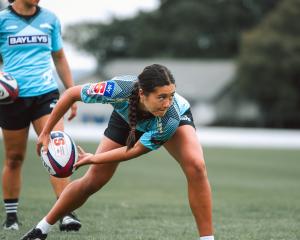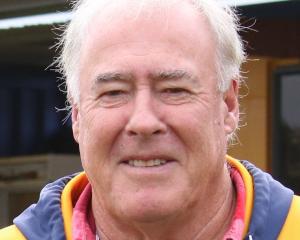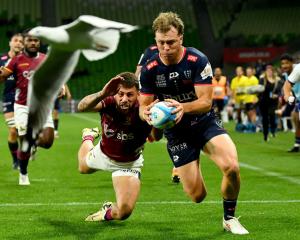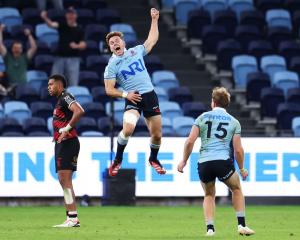On a raw winter's night in Christchurch at a dimly-lit training ground, three men spoke about getting the best out of their rugby team.
Coach Wayne Smith and adviser Gilbert Enoka were in unison but the Canterbury B captain, a burly centre, needed convincing that new methods would be enduringly beneficial. Now there is no greater advocate for the power of mental skills and leadership techniques.
Since Steve Hansen embraced the idea, he has used it throughout his coaching career. He has accelerated the acceptance of Enoka as a mental skills coach inside the All Black tent and encouraged his influence.
"It's Steve who has actually given it jet speed and propelled it into the performance landscape in a way that is really assisting us to deliver good skill sets to the men who have to go to war every week," Enoka confirmed.
Conversations with the 57-year-old former Kiwi volleyball international are laced with metaphors and messages about the power of learning. Enoka has picked up degrees in arts and psychology and runs alongside the All Blacks.
His case for inclusion is simple and one, he argues, more companies should consider. If people are ill, they go to their GP but for an eye problem they go to a specialist, and the same for knees or nose troubles.
"For some reason, people have left the domain of the mind out of it. Most of the obstacles people face and the hurdles they have difficulty overcoming come from how they are going to navigate themselves through things relating to hurdles about mindsets and structures to help move them."
Sceptics had to break prejudices about dealing with shrinks who talked gobbledygook. Widening mental skills helps people reach their targets more efficiently and was another weapon in life and sport.
World greats Richie McCaw and Daniel Carter were no different in needing guidance. Enoka had watched McCaw from his 2001 debut to his 148th and final test, seen his progress and helped with that. It was a case of guiding rather than educating in a formal sense.
There is no menu - it is reacting to situations and individuals. Some players like being private, others prefer to be enclosed in groups.
All react differently.
"Ones you think will cope don't, while others you feel will struggle are fine. Every week is different. Sometimes there's a chat in the corridor, there is no couch involved. Some of the best work is done alongside the coaches where the movement that needs to happen is in my domain rather than that of the coaches."
Decades back, sports psychology and mental skills were ugly duckling areas and if anyone wanted help with their mental approach, people assumed they were ill.
As word circulated and people got to know Enoka, others inquired.
He's been to four World Cups, two with poor results and two with the best outcome and, as a full-time employee, has his sights on the hat-trick in Japan in 2019.
"2007 was the watershed. We thought we had done everything right in terms of preparation and we headed over to France probably waiting to win, expecting to win, and obviously things did not turn out that way and we exited in the quarterfinal," he said.
"We had to look pretty cold and hard at ourselves and I even looked at my area and said I needed some help because I did not have all the answers.
"So we went back and looked at the whole area of performing under pressure because we had not focused the microscope so directly at that particular aspect of performance.
"What I was doing then to what I am doing now is very, very different and the whole focus about performing under pressure, the work we have been doing with specialists around understanding the brain.
"In some ways, it is more about biology than psychology."
The pressure on home soil in 2011 was massive. Enoka's messages were clear: if the All Blacks wanted to be great, then pressure would always be their companion and they had to embrace that. If there was no pressure on a side, then they would never graduate to greatness.
Once the All Blacks and others grasp that concept, they face the pressure and walk towards it instead of looking for somewhere to hide or hoping the heat does not arrive.
"When we look at 2011, the semifinal and final, we probably went from great to good and held on against France really and in 2015 we went great to great to great - France, South Africa, then Australia."
That involved varying forms of pressure, overwhelming one team, coming from a deficit then protecting the lead in the final. The All Blacks did not deviate from their connected plans in each test.
Enoka used some special imagery to concentrate the All Blacks' minds for the 2015 final but won't reveal those concepts as he plans more variations.
"You can't script it. You come to a mountain, look at the peak, say you want to climb it and how do we get people to execute their ambition."
He uses video, conversation, individual chats, group conferences and other voices for his messages. The aim was to put players under the pump to execute their work and gain team success. He, manager Darren Shand, Hansen and assistant coach Ian Foster were very collaborative in their work.
"The 2011 and 2015 World Cups allowed me to look directly into the eye of those achievements and I have an intense thirst to do another one," Enoka said.
So he decided he had to finish another life as general manager for Harcourts if he wanted to help achieve another RWC success.
It was early days for new All Black skipper Kieran Read as he put his imprint on the team. He has a different persona from McCaw and Hansen encouraged him to lead as he wanted.
"Steve has been very particular about that. He's got to be his own man. He has to find his way to lead his men into what lies ahead."
Enoka started his journey in an orphanage in Marton with his five brothers because his father shot through and his mother could not cope. He loved life there and found it very nurturing.
When he left in search of his mother, Enoka had an image of a castle in the sky. What he found was his mother, an alcoholic stepfather and empty flagons on the breakfast table. He left at 16 and headed for university in Christchurch.
It was risky and he was too young, but Enoka got a BA in geography and went teaching, where he met Leigh Gibbs and Smith, who was selling sports gear to schools. Around lessons, he coached volleyball and then won a Woolf Fisher Scholarship for another spell at university.
He added a BSc in psychology and began his PhD before he, Smith and Hansen intersected at Canterbury B practices.
One of the more prominent Rarotongans alongside Dave Rennie and Annie Crummer was on his rugby way.
"We are a small group, a small nation in the Pacific who are a loving, caring, friendly people and we have a few who have pushed into achievement," he said.
He's ticked over his first week back with the All Blacks as they prepare for Warren Gatland and Wales next week at Eden Park. The All Blacks are taking it steadily, wary of overloading the group with too much information.
There are new players, senior men such as Read and his 84 caps, and others who have been around for a few years.
"We do not need to shunt them forward too fast so it overwhelms them."












